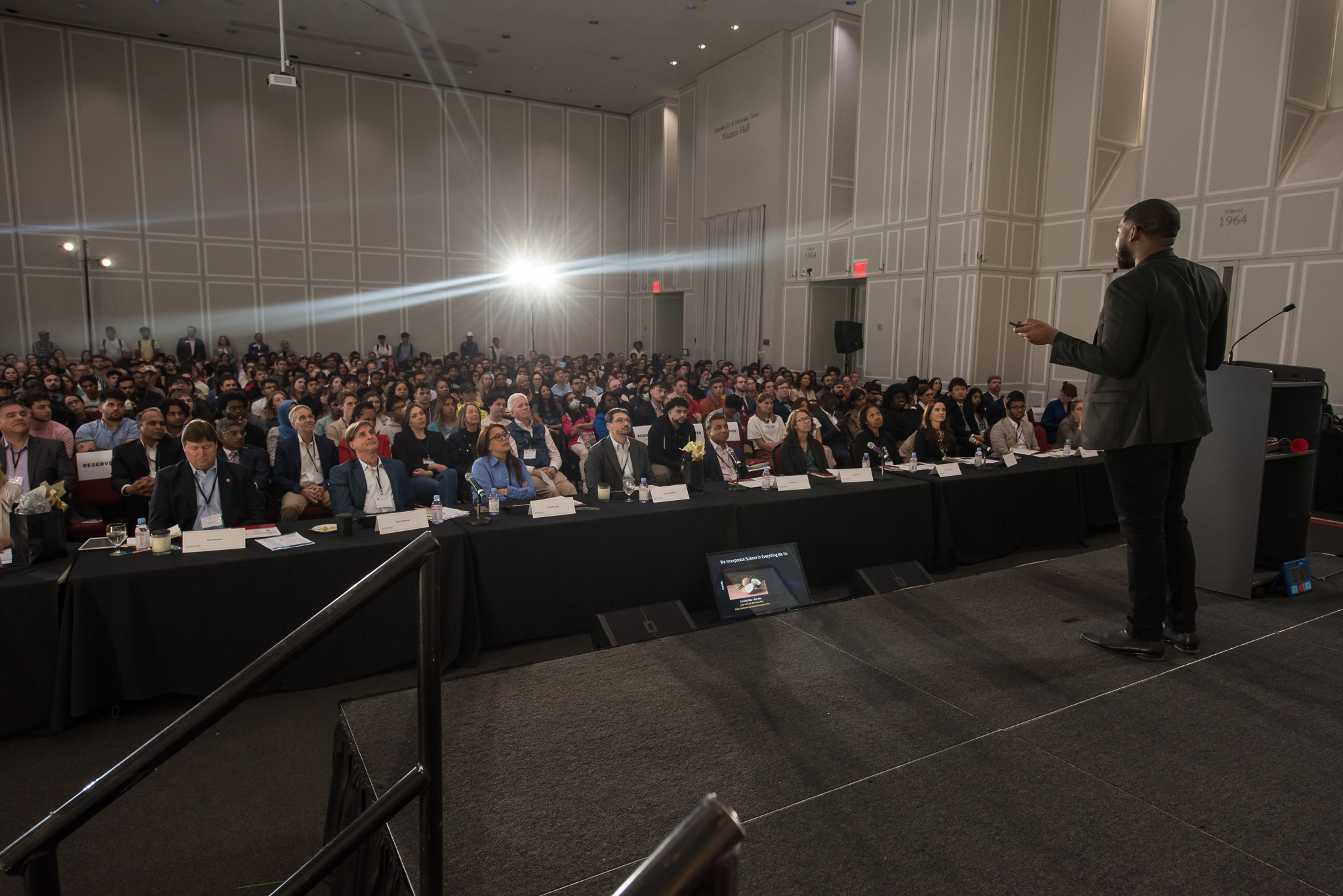Ten student and alumni businesses pitched to a panel of investors and founders for a chance to win a share of over $100,000 in seed funding at the Pitch Dingman Competition finals Tuesday at the Samuel Riggs lV Alumni Center.
The annual competition, organized by the Dingman Center for Entrepreneurship, featured young ventures from schools in the University System of Maryland.
“We have hundreds of students that come to this event that might not have ever pictured themselves on a stage like that,” Haley Mates, the events and marketing manager at the center, said. “It’s meant to spark these students to get involved with the Dingman Center and to try it out for themselves.”
The funding was mostly divided among four main categories: The David and Robyn Quattrone Tech Track for scalable, tech or tech-enabled ventures; the Main Street Track for small businesses not focused on scale with $1,000 minimum revenue; the All Stars Pilot Track for previous winners of entrepreneurship competitions in the system; and the Idea Track for students without a developed business with less than $1,000 in revenue.
Sustainabli, a digital fume hood manager, founded in February 2022 by senior Kevin Tu, senior Telon Yan and freshman Oliver D’Esposito, won the top prize of $30,000 in the Quattrone track. The business aims to make fume hoods, or sashes, which are workstations where scientists work with various chemicals, more sustainable at research universities and institutions.
[UMD team places in top three in national marketing case competition]
Tu, a physiology and neurobiology and economics major, said scientists often don’t turn off their sashes when they are finished, an issue causing 4 billion dollars in energy waste every year. Sustainabli engineered a sensor that reminds scientists to close their sashes and provides data on energy use, cost savings and environmental impact.
If this problem were addressed, Tu said it would be possible to cut back on humans’ carbon footprint by 21 million tons.
“I’m really excited about growing and making a bigger impact on labs and sustainability in general,” Tu said. “I feel a bit surprised because the other competitors were also fantastic so I feel really grateful.”
Sustainabli also won $1,000 through the Tom’s Industrious Entrepreneur Award, an award in memory of student entrepreneur Thomas Savransky, co-founder of Enly, who died in 2021.
The first place prize of $20,000 in the Main Street Track was awarded to Around the Block, an apparel company that aims to build student camaraderie through customized designs based on college towns. Two students at the University of Maryland founded the business in September 2022.
The business’s current design is a map of the Old Town neighborhood in College Park. One of the founders, Gabi McLaughlin, a senior business management and finance major, said the business has generated interest from other colleges and wants to bring its apparel to college towns around the country.
Because it is committed to sustainability and philanthropy, Around the Block donates 10 percent of its revenue to the Memorial Sloan Kettering Cancer Center and practices sustainable production methods, according to the founders.
[UMD student repurposes food waste into renewable energy]
The grand prize of $10,000 in the All Stars Pilot Track was awarded to Meridian Health, an AI digital health assistant that connects young adults to healthcare services near them and tracks data on their health outcomes.
The founder, Aishwarya Tare, an alumni of this university, said she started the business after suffering major health problems that could’ve been prevented. Tare said she’s hoping to assist college students by tracking every step of their healthcare journey from scheduling appointments to accessing medication.
“When we talked to clinicians from over 50 universities, the biggest, most critical issue they pointed to was that access gap,” Tare said. “We are streamlining all of these disorganized and siloed data sets into one operational hub.”
Since February, Meridian Health has been pitching its digital assistant to universities and has three pilot contracts, Tare said. The company plans to open its first university health clinic over the summer.
This year was the first time the competition has allowed students outside of this university to compete, which has helped it build community, Mates said.
“Our biggest goal is to have these students continue to pursue entrepreneurship past college,” Mates said. “It suddenly becomes a realistic possibility for some people that might not have thought it was possible.”



